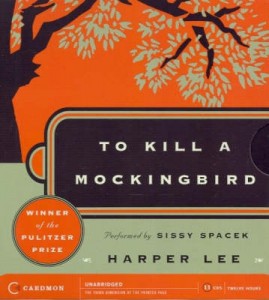 Harper Lee’s novel about a small girl named Scout, her father Atticus, and her brother Jem set during the glory days of the Great Depression in the small, and small-minded, Alabama town of Maycomb. We follow Scout through three eventful years in which we get to know the bigoted, ignorant, and downright hateful white trash, the often martyred and noble population of African Americans, and handful of people like Atticus and his children who don’t hate everyone they meet.
Harper Lee’s novel about a small girl named Scout, her father Atticus, and her brother Jem set during the glory days of the Great Depression in the small, and small-minded, Alabama town of Maycomb. We follow Scout through three eventful years in which we get to know the bigoted, ignorant, and downright hateful white trash, the often martyred and noble population of African Americans, and handful of people like Atticus and his children who don’t hate everyone they meet.
The audio book is read to perfection by the brilliant Sissy Spacek. Her soft Southern accent giving just the right feel to Scout’s continual bafflement at the behavior of the bigots she is forced to live with. I love the sound of Sissy Spacek’s voice, but I found it all but impossible not to picture Gregory Peck whenever Atticus is brought to center stage. Atticus is a great character and his moral high ground is a great influence on Scout and Jem.
As with The Adventures of Huckleberry Finn and Blazing Saddles, the word nigger plays a starring role in To Kill A Mocking Bird. The polite terms used in the book are negro and colored, with black being used once or twice. The Southern name for poor and undesirable Caucasians is White Trash-and we are given to believe that everyone in Maycomb is in one of three groups-niggers, white trash, or people like Atticus, Scout, and Jem. And there ain’t too many people like Atticus, Scout, and Jem.
To Kill A Mocking Bird is a powerful and amazing book-all the more amazing in that there are still people who believe exactly the same things as the denizens of Maycomb today. My own dear old Mom and Dad expressed nearly identical opinions when I was growing up and I still run into people who keep the spirit of Archie Bunker and Adolph Hitler alive and well today. Among the many things that confuse Scout is that her teacher hates Hitler and his treatment of the Jews, but she was perfectly happy to see a black man wrongly convicted of a crime he didn’t commit.
The story is slow to unfold itself and the tale of Scout’s adventures lead into Civil Rights and the evil of poverty and ignorance. The white trash villain Bob Ewell is given excuses for his behavior at every opportunity by Atticus-that’s just the way he is is a phrase that is often used for the many odd and baffling people that Scout encounters. The idea that these people can change is proved when one of the white men on the jury doesn’t want to convict the black man-but Atticus tells his children that he doubts anything meaningful with change in their lifetimes.
It’s a picture of both a world that is gone, and one that still lingers in every city with black neighborhoods and white neighborhoods. At least it is now a self imposed segregation, and not one mandated by Law.
- Starfield – A Few Months In - December 23, 2023
- Still Just A Geek by Wil Wheaton - November 1, 2022
- Starfield First Impressions of Gameplay Reveal - June 13, 2022